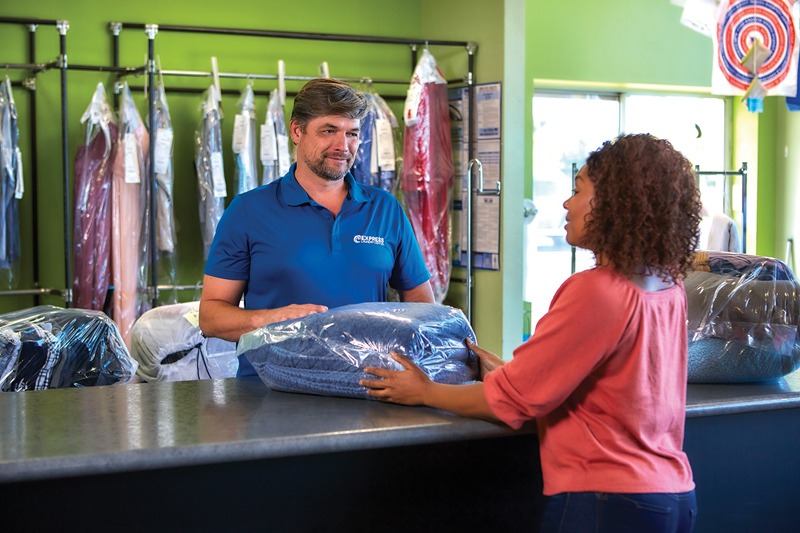Planning for Full-Service Offerings at Your Laundromat
A growing number of vended laundries are now offering full-service wash-dry-fold and/or residential/commercial laundry services. And for good reason.
After all, through this type of diversification of services, laundromat owners can better penetrate their demographic and geographical service area for additional revenue and profit.
However, to do so effectively, planning is essential. So, if your goal is to develop or renovate a laundromat – and design it to maximize full-service work – check out the following planning tips below before jumping in…
Evaluate Your Lease
If you’re leasing a space for your laundromat, consult with others who are already in the business to help with negotiating your lease, and be sure to get several legal opinions before signing. For instance, you want to make certain that a competing laundromat can’t move in next door to you in the same strip mall – this does happen, and it clearly could be detrimental to the future of your business.
Space
Plan for extra space inside your laundromat – or at least somewhere near your store – to house all of the right equipment, as well as to store garments and linens before and after processing. If you plan to launch a commercial laundry processing service for vacation rentals, spas, hair salons, small hotels, catering companies, and restaurants, a flatwork ironer also will be critical. You’ll require about 200 square feet of space dedicated to the installation and operation of a 13-inch flatwork ironer. What’s more, I’d recommend an additional 100 to 200 square feet of shelving for storage.
Point-Of-Sale System
If you truly want to grow your laundry business efficiently, a POS system for full-service work is an absolute necessity. Look for one that includes a website for your business, thus making online orders and tracking simple. A good website is essential for marketing and managing your full-service offerings.
A POS system not only enables customers to schedule and pay for wash-dry-fold services online or through their phones, but it also simplifies management and tracks payments, laundry processing, scheduling, and deliveries.
Equipment Needs
If you want to offer a strictly residential wash-dry-fold service, you can get by with basic vended washers and dryers – just be sure to have plenty of them. However, if your intent is to process both residential and commercial laundry, commercial washer programmability and automatic chemical injection are essential to help produce consistent, high-quality results, as is a flatwork ironer for ironing flat goods. Your residential customers and commercial clients will be more than happy to pay extra for this premier service.
Washers – Choose highly programmable washers with automatic chemical injection capabilities and programmable water temperatures, because it’s difficult to achieve consistent, quality results using preprogrammed vended cycles. Body oil, lotions, and food stains are very tough to remove using the typical one- or two-rinse cycles of a standard vended program.
Ironer – A flatwork ironer quickly and automatically irons bed sheets, pillowcases, and table linens, allowing your laundromat to service larger accounts that require high-quality linen finishing. Look for a compact ironer that is simple to operate, with a wax-less design.
Maximum Efficiency
Last year, the cost of natural gas reached its highest point since 2008, according to the U.S. Energy Information Administration, and it’s expected to climb 30 percent this winter over last winter. In Southern California, gas prices just jumped 315 percent, making it the biggest increase yet. So, it remains imperative to plan for maximum efficiency.
Ozone – One way to do so is through the use of ozone. Ozone is a gas that – when injected into a wash cycle – sanitizes the laundry load; activates wash chemistry; relaxes garment fibers for improved removal of dirt, stains, and grease; and works best in cool water. It reduces fabric wear and lowers utility costs. Of course, be sure to install washers in your laundromat that are ozone-compatible.
High-speed washers – A second way to reduce natural gas costs is by choosing high-speed washing machines with high extract speeds. These washers will remove more moisture from the laundry during the extract cycle, which can reduce the resulting drying time by up to 50 percent or more. And, since dryers consume a great deal of natural gas, high-speed washers also reduce natural gas costs. A side benefit? Customers will complete their laundry faster.
Pickup and Delivery
Another decision is to determine whether or not your laundry services will include a pickup-and-delivery service, based on your market demographics. Pickup and delivery has become a growing trend in the laundry industry, sparked by dual-income households and the recent pandemic. In addition, it could help to protect your laundry business in the event of another pandemic, especially should the self-service segment of your operation slow down or perhaps even face a temporary shutdown.
If you choose to add a pickup-and-delivery service, analyze your trade area and keep your PUD route relatively tight in the beginning. This will ensure that fuel and labor costs don’t eat away at your profits. Of course, you’ll also need trained employees and a delivery vehicle. Start with a few customers or key commercial accounts, and improve processes as you grow. Your point-of-sale system should help you manage and track your pickup-and-delivery orders.
When building a full-service laundry business, there’s a lot to consider. Fortunately, you’re not alone. Quality equipment distributors are extremely familiar with their local vended laundry markets and can lead you through every step of the laundromat planning process. Of course, be sure to discuss your goals related to full-service work with your chosen distributor well ahead of time. Additionally, visit laundry operations that are currently catering to the full-service market and doing it well – you can learn a lot from other successful operators, and it may just shorten your own learning curve.













What’s the best payment App for Electrolux machines?